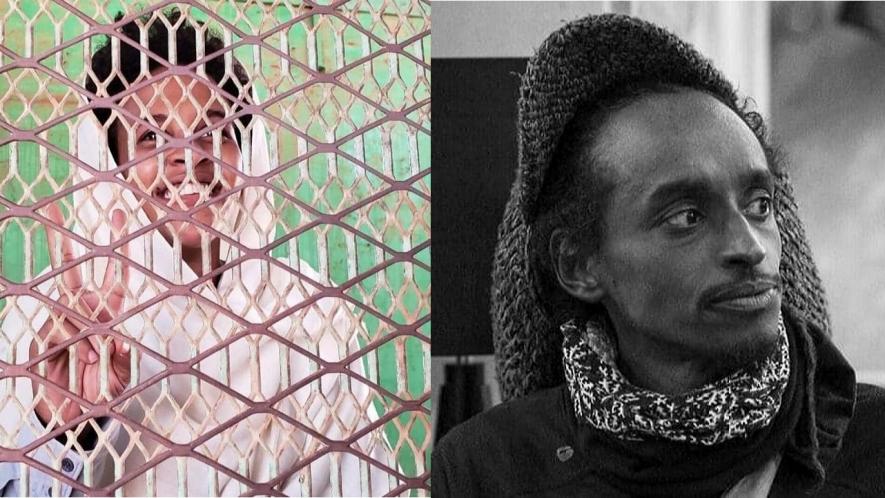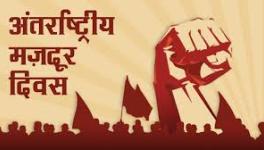Sentencing of Prominent Artists by Sudanese Court Causes Uproar

Left : Duaa Tarig in a court on August 17, 2020; Right : Hajooj Kuka. Source Facebook
On September 17, five Sudanese artists, of the 11 that had been arrested on August 10, were sentenced to two months imprisonment and a fine of USD 90 each. They were found by a court to be guilty of “threatening peace” and “breaching public safety.” The remaining 6, also facing the same charges, are expected to be sentenced on September 27.
These artists from the theater group known as Civic Labs were sympathizers of the December 2018 revolution, which overthrew the former Islamist dictator, Omar al Bashir, and made way for the current civilian-majority transitional government.
The most prominent of the 5 artists who were sentenced is Hajooj Mohamed Haj Omar, better known as Hajooj Kuka. He is an internationally acclaimed filmmaker whose documentary Beats of the Antonov — about the music, dance and resistance of the communities displaced to due civil war in Blue Nile and Nuba mountains in the country’s south — won the People’s Choice Award at the Toronto International Film Festival in 2014.
In 2018, his first narrative feature film Akasha, set against the backdrop of the civil war in South Sudan, was nominated for the Best Film at the Venice International Film Critics Week. In recognition of his works, in June 2020, he was admitted to the Academy of Motion Picture Arts and Sciences — the body which awards the Oscars.
Kuka is no stranger to the inside of prisons. As an activist, he was arrested in February 2019 for his role in organizing the mass demonstrations, which in June that year brought Bashir’s 30-year-long dictatorial rule to an end.
However, the biased sentence handed down by the court, and the behavior of the police who colluded with an Islamist mob which attacked Kuka and his colleagues, has made it evident that the reforms undertaken by the transitional government which replaced Bashir, still has a long way to go.
Police collusion with “Islamist instigators”
The incident occured on August 10, when Kuka and 10 of his colleagues from Civic Labs, an artists’ collective that was formed in the wake of the December Revolution, were rehearsing for a play in their office space in the El Zohour neighborhood in the capital city, Khartoum.
At around five in the evening, some neighbors complained about noise in the neighborhood. Though the artists decreased their volume, the loud noises persisted. 28-year-old Duaa Tarig Ahmed Mohamed, the Program and Office Manager of Civic Lab’s central office, went out to investigate.
She found that a man in the neighborhood, who had been repeatedly harassing the visitors to their office, had been making noise. When she appeared, he physically assaulted Duaa. When one of her colleagues intervened to stop him, a mob from the neighborhood gathered outside the office and began an attack against the artists in the office, who were forced to retreat inside and shut the door.
The police who arrived on the scene later, allegedly tied up the hands of these artists and allowed the mob to assault them with sticks and stones. Kuka described this mob as “Islamist instigators.”
Despite injuries, the artists reported that they were denied access to a doctor. They were instead taken to a police station, where the investigator Al Safi Mahdi slapped Duaa until she was rendered unconscious, after she objected to him taking a picture of her on his personal phone. Her repeated requests to file a case against this investigator was refused by the police who said that they were too “busy”.
All the 11 artists were eventually charged with public disturbance and disruption of public safety. Duaa was also among the five who were convicted of these charges on September 17 by the Central Khartoum Primary Court. In this hearing, the investigator who assaulted her in custody, appeared as the complainant.
While the artists have accused the Islamic fundamentalists of physically assaulting them, they have not been arrested. Police have refused to press charges against the investigator, who is also accused of physically assaulting a Duaa, on the grounds that they do not have the time.
Verdict faces international condemnation
“According to the laws of Sudan, the accused cannot stand as a witness in a case before the court. The law may be the reason the police arrested so many of Duaa’s colleagues along with her – now that they are all defendants they cannot stand as witnesses for each other. All the witnesses of the incident were either defendants, assailants or law enforcement personnel,” read a statement by Strategic Initiative for Women in the Horn of Africa (SIHA).
“Sudanese people,” the statement further added, “are still ruled by a legal framework that denies citizens access to justice. The legal framework, legal procedures and the articles of the law itself are designed to criminalize and prosecute civilians, particularly women and minorities. Women and activists are still an active target of law enforcement in Sudan, and the criminalization of women is legally enabled.”
Pointing to the failure of the transitional government in reforming the laws and the functioning of the bodies in charge of enforcing them, the Sudanese Professionals Association (SPA), which spearheaded the December revolution against the former regime, said in a statement on September 20, “It is a shame that the same old laws that were made to suppress…our people prevails, despite our great revolution that came to end those inhumane practices.”
Harsh condemnation has also come from the Resistance Committees, which, organized at the neighborhood levels, form the backbone of this protest movement which continues to pressurize the transitional government towards completing the reforms it was tasked with.
The committees in Khartoum called for protests to secure her release and to oppose the transitional government’s intention to keep the reactionary laws intact to use them against the protest movement.
Outrage has also come from the film-makers and producers in Europe and North America. The European Film Academy has said in a statement that the “International Coalition for Filmmakers at Risk (ICFR) and its founding institutions, the European Film Academy, International Documentary Film Festival Amsterdam and International Film Festival Rotterdam call for the Sudanese authorities to immediately and unconditionally release filmmaker Hajooj Kuka and the four artists imprisoned with him.”
“Hajooj Kuka is an exceptional filmmaker. His last two films, Beats of the Antonov and Akasha, played at our Festival. He was recently invited to join The Academy. Now he’s been jailed in Sudan. We need to make some noise about this,” tweeted Cameroon Bailey, the artistic director of Toronto International Film Festival.
Courtesy: Peoples Dispatch
Get the latest reports & analysis with people's perspective on Protests, movements & deep analytical videos, discussions of the current affairs in your Telegram app. Subscribe to NewsClick's Telegram channel & get Real-Time updates on stories, as they get published on our website.














